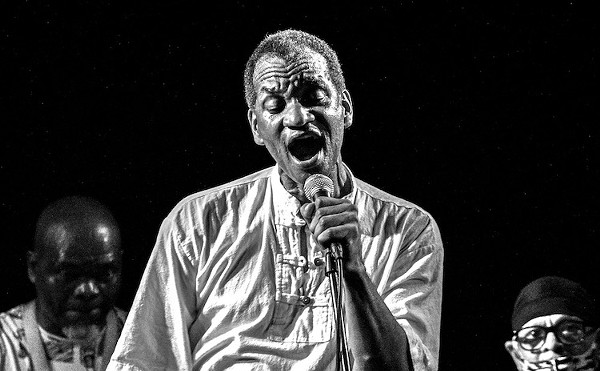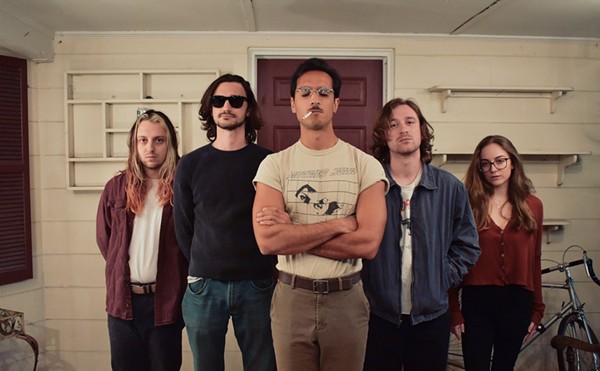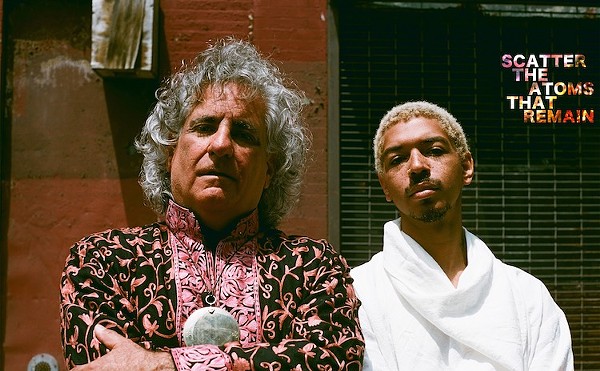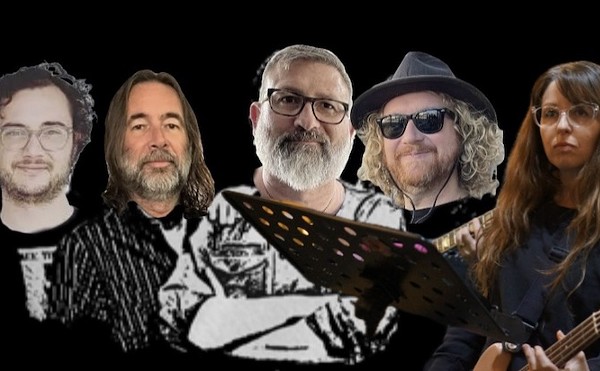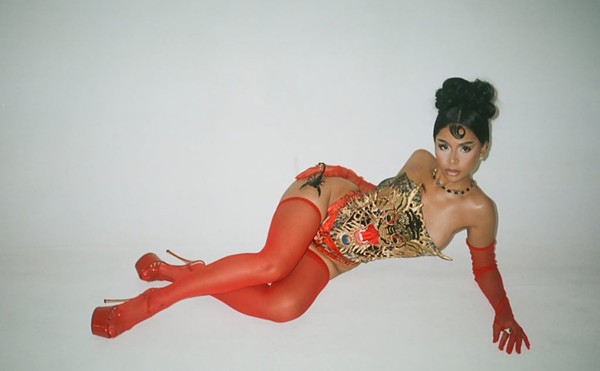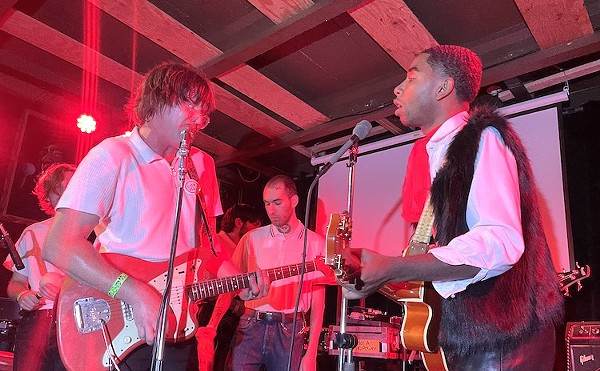Year of the Rabbit should break the curse of Failure
Ken Andrews' 10 years in the trenches of the rock business should be a cautionary tale. It would be a brief one, beginning and ending thusly: There once was a guitar player from L.A. who knew how to write, play and produce great music that was built on artistic integrity and individual vision. He was enthusiastically admired by his musician peers. He was held up as a new hope by a small subset of the rock press. And, to an even smaller -- but more enthusiastic -- group of fans, he was the guy that made records that sounded like their fantasy alt.rock radio station. Along the way, he made a name for himself as a guest musician, a producer and one of the best record mixers in L.A. His first band was screwed over twice: once by a large indie that decided they didn't like his band anymore (but would readily manipulate him) and then by a befuddled major label that loved him, but was unprepared to make him a star. His second "band" wasn't really a band, but it too was screwed over by a befuddled major label that loved his record, but had no idea what do with it and eventually lost interest. His third band releases its major-label debut in July.
The moral of the story? Well, the story's not over yet, but Andrews must think that it's: "Third time's the charm."
"I wanna do my own music," says Andrews of why he made the decision to have a go at major-label life again. "Indies, majors, they all suck. I have plenty of friends on indies getting screwed too ... . At the end of the day -- for this band -- I just wanted to be at a place where, at first, the people who brought us in understood what we were doing, and for this band, that was Elektra."
Thus, Elektra is the home for Andrews' new band, Year of the Rabbit. The 11 songs on the band's self-titled debut find Ken reimmersed in a group environment, after he spent the past few years focusing on production work and the bedroom-studio electronica of a project he called On. Andrews is most well-known for the work he did as a member of Failure, an aptly-monikered collaboration of two monstrously talented, multi-instrumentalist egos (Andrews and Greg Edwards) and whichever drummer was brave enough to get between them. The group made two of the finest alternative-rock albums of the '90s, "Magnified" and their unimpeachable masterpiece "Fantastic Planet."
Though the group's sonically rich, but accessibly heavy recorded output made Failure minor legends among the few people who heard them (their only chart success was a brief showing on Billboard's Modern Rock Tracks chart for the "Stuck On You" single), the sessions that yielded that output were famously contentious. Andrews and his bandmates were continuously beset by creative differences, leading to fights over issues large and small. That it took the group seven laborious months in an isolated house in the Southern California scrublands to record "Fantastic Planet" only exacerbated the animosity and, after a brief tour (which brought in A Perfect Circle guitarist Troy VanLeeuwen to flesh out the sound), Failure split up.
"Greg and I fought a lot, but looking back, I enjoyed the collaboration and the balance," says Andrews, fully utilizing his hindsight-through-rose-colored-glasses abilities. "It was unfortunate that he and I always had to fight about it instead of have fun with it."
With his previous internecine battles, it wasn't surprising that Andrews would seek to make music on his own after Failure. This was the genesis for On, a home-studio concoction that found him applying his dense, guitar-driven production ethos to songs built on drum programs and samples. Far from dance music, the songs managed to merge the propulsive rock thickness of Failure with a futuristic sheen. After inking a deal with Epic Records, Andrews completed the album, "Shifting Skin," and, prior to its release, the label -- seemingly excited -- commissioned a remix single for the song "Soluble Words." The single got unofficially (and enthusiastically) added to stations up and down the West Coast, two months before the album was due. All appearances were that the right kind of momentum was building for the project.
And then, there was silence.
"The stations started calling the label wondering where the support -- a video, an official add date, anything -- for the airplay was and the label never gave it to 'em," says Andrews. "For some reason, [Epic] got cold on it. I don't think I'll ever know why. I'm still sort of mystified, myself. It was really a heartbreaker."
In the process of picking up the pieces, the remainder of the On tracks not committed to "Shifting Skin" were compiled on the self-released "Make Believe" CD and Andrews soon found himself inspired to form yet another band. Throughout the course of Failure, he had pursued various side projects like the Replicants (a New Wave cover band that included Paul D'Amour of Tool) and production and mixing jobs (Black Rebel Motorcycle Club, Creeper Lagoon) were also keeping him busy. So, when he began pursuing Year of the Rabbit, fans began to wonder if it was just another side project.
As far as Andrews was concerned, there was no question.
"It's definitely a band, and every week that goes by, it becomes more and more of a band," he says. "As time goes on, my initial spark and guidance that was needed is becoming less needed as the band gets its own identity."
In fact, says Andrews, even collaboration is a more pleasant experience.
"There's definitely conflict in this band, and we fight about stuff, but it's nowhere near the animosity level that was present in Failure. The other members of the band had a big impact on the sound of the record. I bring in the songs pretty bare bones, just rhythm guitar, vocals, lyrics and basic structure. From there, the band puts in their own parts and the structure changes, so the entire song just takes on a new sound. This band feels balanced, mentally and creatively. It doesn't feel as labored, it feels more natural."
And that balance is clear on the 11 tracks that make up "Year of the Rabbit." Much of the guitar-thick production and melodically heavy arranging that made Failure so engaging is present, but YOTR also evidences the raw clarity that comes from a brand-new rock band still figuring itself out. Certainly Andrews guides the proceedings -- as is clear by easily-identifiable tracks like "Vaporize" and "Strange Eyes" -- but many of the songs are pointing the band in a looser, more rocking direction. "Say Goodbye" is possessed of a sweet melancholy that would have never emerged from Andrews' tension-wrought past. Similarly, "Rabbit Hole" is a chunky pop song that nearly explodes with giddy rock power. And onstage is precisely the place where Andrews -- sound designer and studio auteur that he is -- seems to enjoy the band the most.
"I was high for weeks after the first show," he says. "All the feelings that I'd hoped I'd have were just amplified. I loved it. I felt the familiarity of being onstage with a powerful rock group like Failure, but it was just ... I don't know, it was awesome."
Hopefully, his enthusiasm -- and luck -- will win out.




